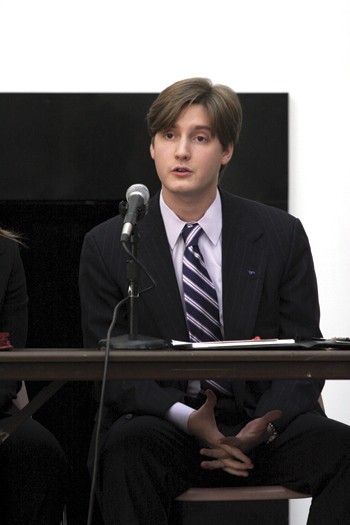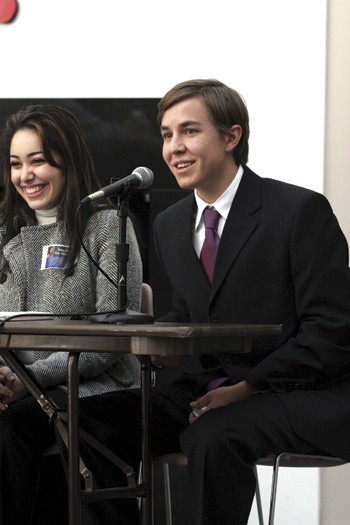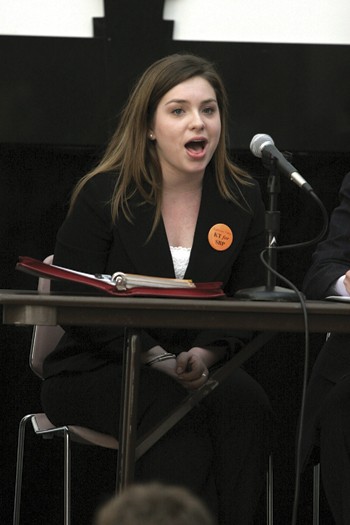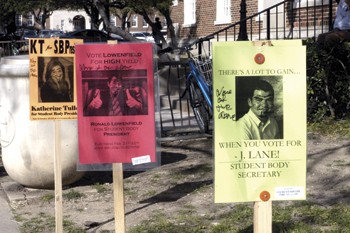
Brooks Powell (Christina Parrish)
Candidates for student body president, vice president and secretary participated in a debate Tuesday in the Hughes-Trigg Commons.The debate was designed to provide an interaction between candidates and their constituents and give insights into platforms.
These insights, however, reached few students other than those who are already in Senate.
The event had been scheduled to begin at noon, but the time was moved forward to 12:30 to accommodate candidates and other students who had an 11 a.m. class.
The time change was not publicized, though, and the audience consisted primarily of candidates and senators.
Student Body President Taylor Russ said although he was disappointed by the lack of student attendance, the lack of audience is comparable to debates in previous years when there was more publicity.
“It would be smart to consider changing the debate to a different time, maybe on a Monday or Wednesday afternoon when there would be a better chance for students to be able to attend,” Russ said.
Senior Michelle Wigianto, who attended part of the debate, said she thought there were more students at debates in previous years, and that the time and the lack of advertising probably combined to account for the low attendance.
Senator Brooks Powell, a candidate for student body president, agreed that the lack of publicity contributed to low attendance.
“We’ve been having a few problems with getting communication in line and organizing,” Russ said. “It’s correcting itself, because Taylor Armstead is a great communications chair.”
According to Wigianto, “I feel like a lot of it is student apathy, and part of it is probably because the debate isn’t highly publicized.”
If a lack of attendance is an indicator of apathy, then the defacing of SBO candidate stake signs points to downright hostility.
Tuesday morning, each of the stake signs around campus advertising SBO candidates had been scribbled on with permanent marker. “None of the above,” was written on each sign.
According to Wigianto, “It seems like if you look at it based on stake signs, all year there’s nothing about the issues and all of a sudden there are stake signs advertising the elections. So for average students it would seem like, ‘Who are these kids who are telling me to vote for them when I feel they aren’t doing anything for me?'”
Instead of simply telling students to vote for a particular candidate, Powell said, the debates would “give students a real-life look at what kind of leaders the candidates were going to be.”
The debate began with the candidates for secretary, which include Senator Lamar Dowling, first-year John Jose and Senator Jonathan Lane.
Dowling discussed the problems with the student body understanding what’s going on with senate and said he wants to change such problems.
“I’m not the best debater, but I do have good values, and if elected I will do what I say I’m going to do,” he said.
Jose said that the secretary can ensure Senate is doing all it can to reach out to students.
Lane stressed the importance of transparency and accountability.
“You only see what senators are doing once a year – when they come around to get your vote.”
That’s why a major part of Lane’s platform is creating Senate blogs as a means of communication between Senate and the students.
Next up were the candidates for vice president. Senator Bethany Peters, Senate Speaker Lulu Seikaly and first-year senator Rachel Simpson took turns fielding questions.
Peters said that Senate can accomplish things if it has good leadership, “but unless we have someone who can hold students together, it’s not going to happen.”
In order to be this tie for the SMU community, Peters plans to be in the Senate office every day with the door open.
Seikaly thinks Senate is currently taking a passive role in interacting with students and that it needs to be active.
“Students need to see that we’re not intimidating,” Seikaly said. “I want to work with the chair of Encore, which is the new Week of Welcome, to show first-years that we are people.”
Simpson, a first-year senator, has written two pieces of legislation and served on the Communication Committee this year.
“I hope to be more adamant with the administration to get something done,” Simpson said.
She also wants to improve communication by creating a central bulletin board announcing what’s happening in Senate and by putting a list of Senate contacts in every dorm room.
Student Body Vice President Katherine Tullos, Student Body Secretary Brooks Powell, Senator Mora Namdar and Senator Ron Lowenfield then took the stage for the presidential debates.
Tullos said the goals in her previous platform for vice president are things she actually achieved this year. She hopes to improve academic advising, create open dialogue forums for the entire campus to discuss important issues and establish routes for Giddy Up to allow the program to better serve students.
“My experience has given me a broad perspective to relate to the student body. I think it’s important to have a president who’s willing to work for all students,” she said.
Powell wants to address campus safety by improving lighting in key areas of campus. He also wants to ensure that students on scholarships don’t see them decline in value as they progress through school. Additionally, he wants to address the Memorial Health Center’s problems.
“I want to improve students’ quality of life,” he said.
Namdar believes her vision is clear from the legislation she’s written for campus this year, including a bill to create a Human Rights major.
“I hope to make SMU more nationally recognized in a positive way,” she said.
She wants to address tuition increases, unify student groups and believes that groups shouldn’t be penalized for working together.
Lowenfield also believes that tuition increases are unreasonable, wants to improve quality of student life and encourage the administration to step up to its financial obligations.
“This is where you can effect real change,” Lowenfield said.
Students can vote for SBO candidates at smu.edu/elections until 7 p.m. on Thursday.

Mora Namdar and Ronald Lowenfield (Christina Parrish)

Katherine Tullos (Christina Parrish)

Student body officers’ signs were vandalized at some point late Monday or early Tuesday. (Lindsey Perkins)








